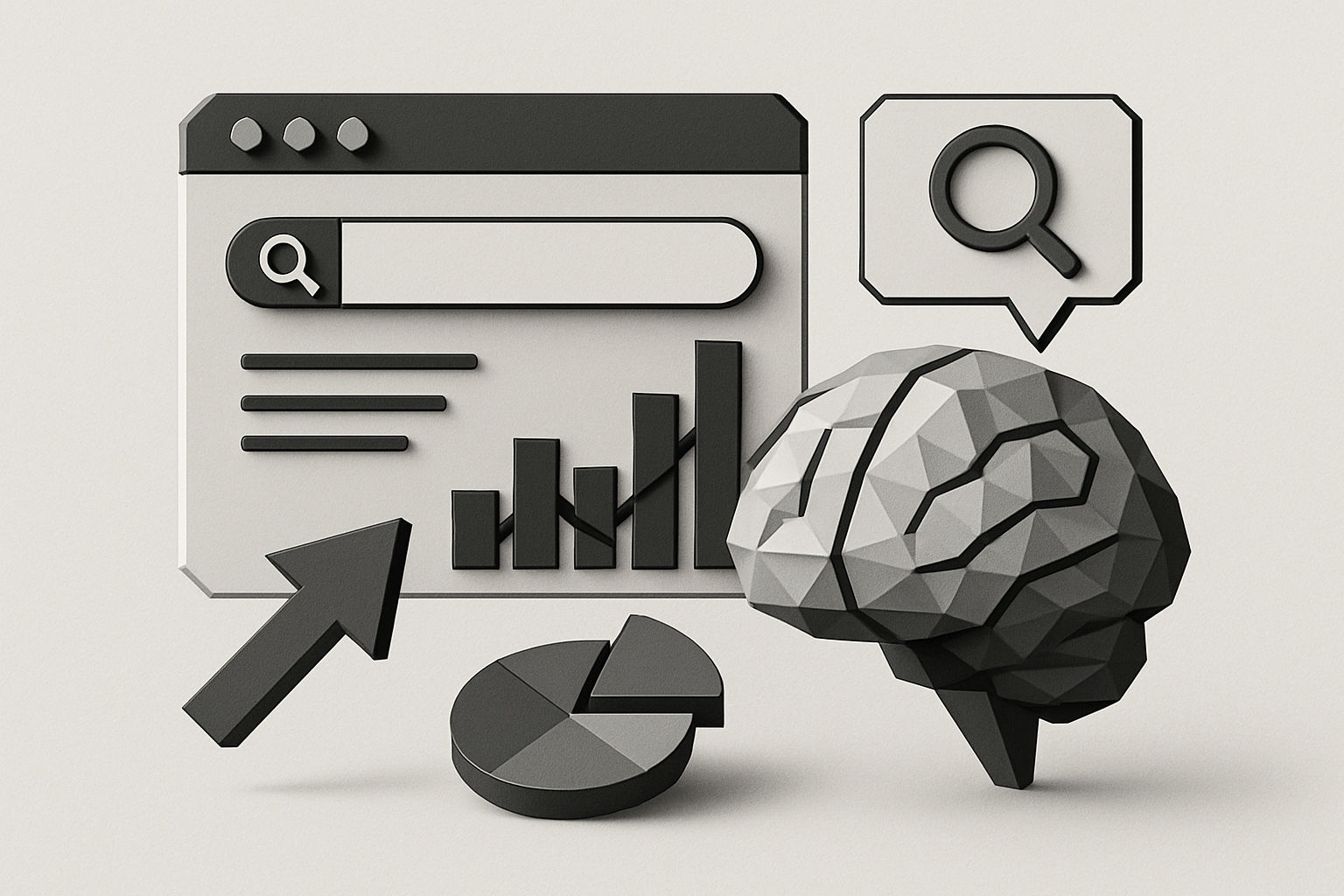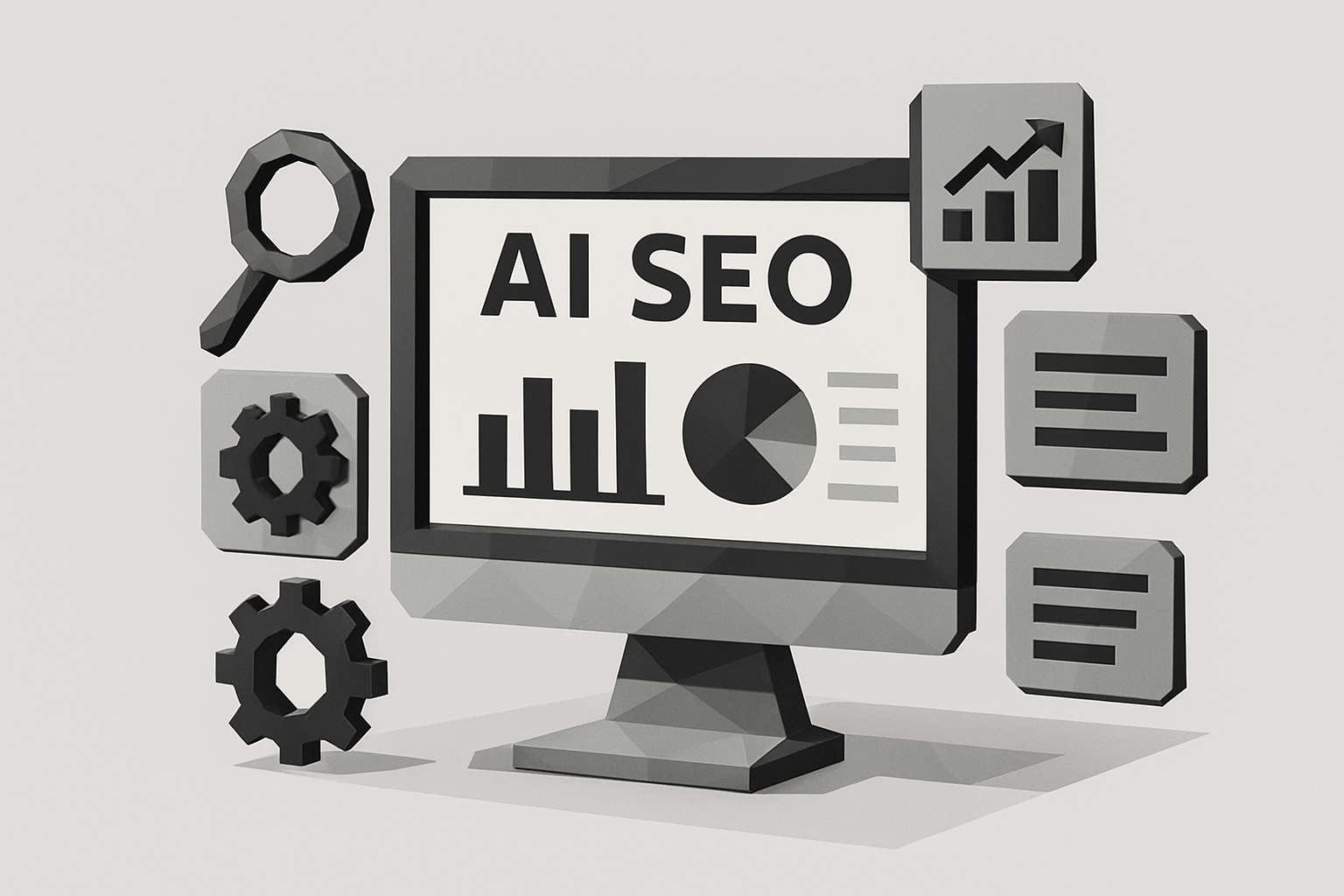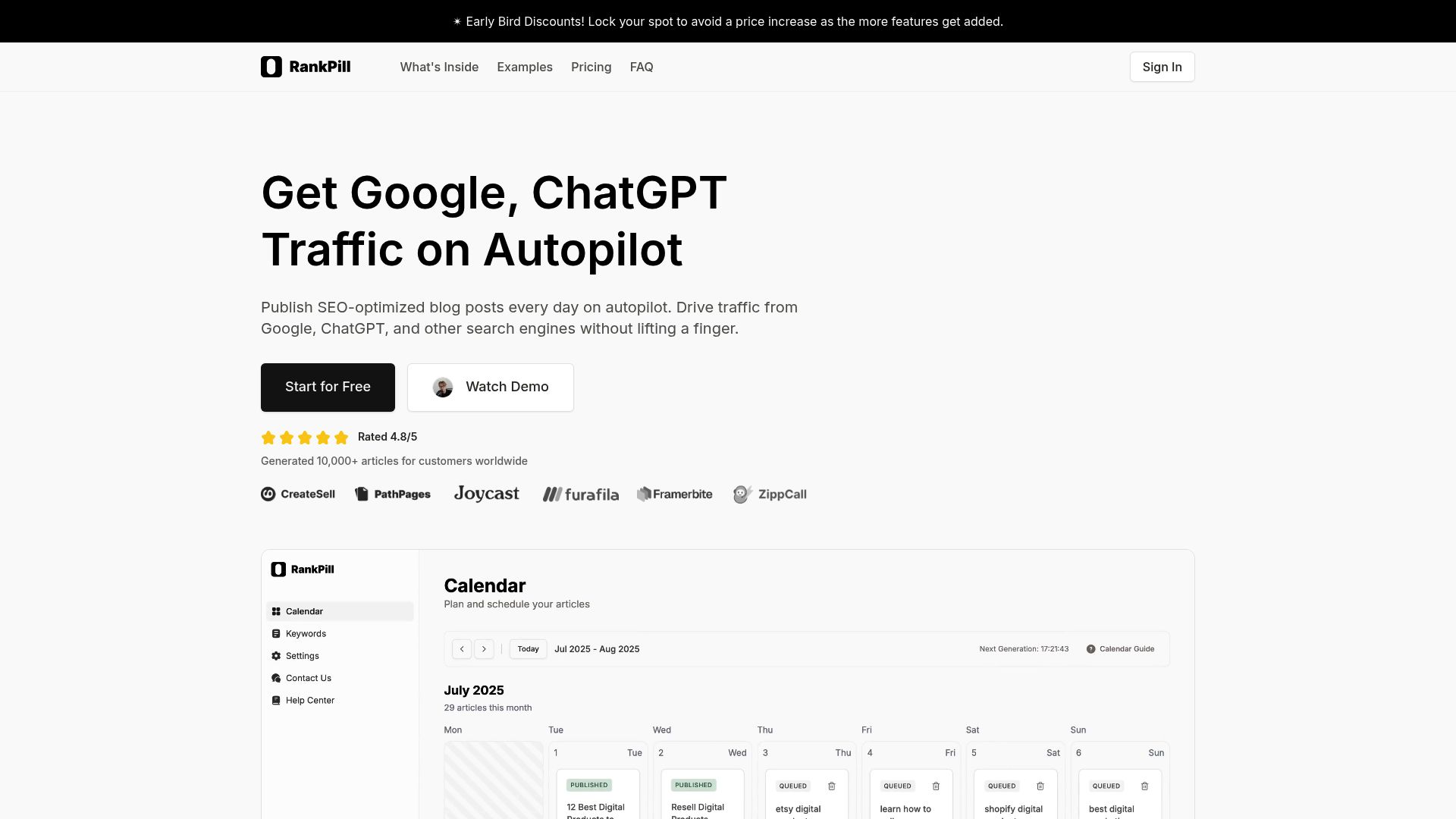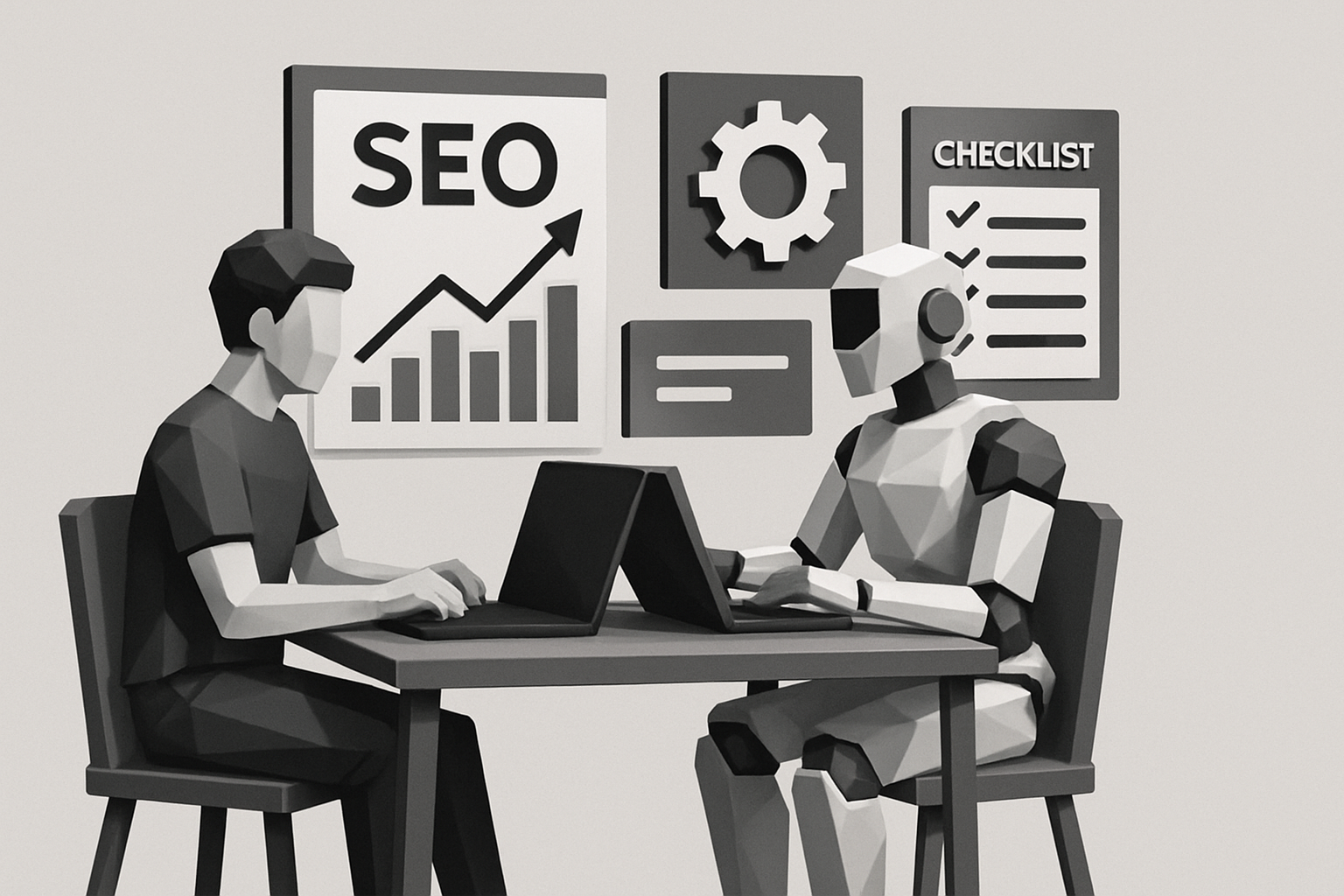Imagine boosting your website’s traffic and rankings—without spending endless hours on manual optimization. That’s the promise of using ai for seo in 2025.
This guide will break down how AI is changing the SEO game, making powerful strategies simple, fast, and accessible for beginners. You’ll get a clear, step-by-step roadmap for leveraging AI tools to achieve real results.
We’ll show you how AI can help with keyword research, content creation, on-page SEO, analytics, and more. Ready to unlock the next level of SEO success? Let’s dive in.
Understanding AI in SEO: Foundations and Benefits
Artificial intelligence is revolutionizing the way we approach digital marketing. If you’re curious about using ai for seo, you’re not alone. More beginners are discovering how AI tools can simplify complex SEO processes and deliver impressive results.

What is AI and How Does It Apply to SEO?
Artificial intelligence (AI) refers to machines simulating human intelligence, especially for problem-solving and learning. Machine learning, a branch of AI, lets systems improve with experience. In digital marketing, using ai for seo means leveraging these technologies to boost website visibility.
AI mimics human reasoning for search optimization. For example, Google’s RankBrain and BERT use natural language processing (NLP) to better understand search queries and user intent. Core AI technologies in SEO include NLP for analyzing language, data analysis for discovering trends, and automation for managing repetitive tasks.
Key Benefits of Using AI for SEO
The benefits of using ai for seo are hard to ignore. AI automates keyword research, content audits, and technical checks, saving you hours each week. It can process massive amounts of data, spot trends, and deliver insights in seconds.
Check out this summary table:
| Benefit | Description |
|---|---|
| Speed | Automates time-consuming tasks |
| Scale | Analyzes large datasets instantly |
| Accuracy | Minimizes human error |
| Personalization | Tailors content for users |
| Data | Predicts SEO trends |
A recent study found that 60% of marketers saw improved rankings with AI-powered tools (AI's Impact on SEO Performance). Personalization is another plus, as AI tailors content to user preferences for better engagement.
Common AI SEO Myths and Realities
There are several misconceptions about using ai for seo. Let’s clear up some common myths:
- Myth: AI will replace human creativity.
- Reality: AI supports and augments your creativity, but doesn’t replace unique ideas.
- Myth: Only experts can use AI for SEO.
- Reality: Many AI SEO tools are built for beginners and have user-friendly interfaces.
- Myth: AI tools are expensive and complex.
- Reality: There are both affordable and easy-to-use options available.
It’s important to remember that AI is a tool, not a magic wand. Human oversight and strategic thinking are still essential.
How AI is Shaping SEO in 2025
The landscape of using ai for seo is rapidly evolving. Search algorithms are now focusing more on user intent, thanks to AI advancements. Voice search, visual search, and conversational AI are changing the way people find information online.
AI-powered chatbots are also becoming standard for on-site engagement, helping users find answers quickly. In 2025, voice searches account for 30% of all queries, showing just how much AI-driven technology is influencing search behavior. Staying current with these trends is crucial for SEO success.
Step-by-Step Guide: Using AI for SEO Success
Ready to unlock real results by using ai for seo? Here’s a practical, step-by-step roadmap to harness the full power of automation, analytics, and smart content creation. Each phase below shows how beginners can apply AI to get measurable SEO wins—fast.

Step 1: AI-Driven Keyword Research and Analysis
The first step in using ai for seo is finding the right keywords. AI tools can scan millions of search queries in real time, uncovering high-potential keywords that human research might miss. They dig deep into long-tail and semantic terms, ensuring your content aligns perfectly with what your audience is searching for.
For example, imagine an AI platform that not only suggests popular keywords but also reveals hidden opportunities based on competitor gaps and search trends. These tools save you up to 80% of the manual effort usually spent sifting through endless lists.
Want to dive deeper? Check out these AI-powered keyword research strategies to see how automation can supercharge your keyword discovery process.
Step 2: AI Content Creation and Optimization
Once you have your keywords, using ai for seo can streamline content creation. AI-powered platforms generate detailed, human-like blog posts and landing pages that are SEO-optimized from the start. Natural language processing (NLP) helps identify content gaps and ensures your articles stay relevant and comprehensive.
Some tools can produce 3,000+ word articles, complete with optimized headers, meta descriptions, and internal links. This not only increases your publishing speed but also boosts your output by up to 5x, letting you scale your content strategy quickly.
A typical workflow might look like this:
- Enter your target keywords
- Review the AI-generated draft
- Edit for brand voice and expertise
Step 3: On-Page SEO Automation
Optimizing every page detail is crucial when using ai for seo. AI tools can handle meta tags, headers, schema markup, and even internal linking automatically. Real-time SEO scoring provides instant feedback, helping you fix issues before publishing.
Some platforms go further, generating image alt text and embedding videos where relevant. This level of automation ensures your pages are always up to date with the latest search engine standards.
Here’s a quick table comparing manual vs. AI-powered on-page optimization:
| Task | Manual Effort | AI-Powered Effort |
|---|---|---|
| Meta tags | 10 mins/page | Instant |
| Headers | 5 mins/page | Instant |
| Schema markup | 15 mins/page | Instant |
| Alt text | 3 mins/image | Instant |
Step 4: Competitor Analysis and SERP Tracking
Staying ahead requires more than just content—it means outsmarting your competition by using ai for seo. AI-powered tools monitor competitors’ rankings, backlinks, and content strategies around the clock.
With predictive analytics, you can spot ranking opportunities before they become obvious. For instance, some platforms alert you instantly to keyword drops or the appearance of new SERP features, helping you adapt your strategy in real time.
Key benefits:
- Automated competitor tracking
- Fast identification of new keyword trends
- Alerts for ranking changes
Step 5: Technical SEO and Site Health Monitoring
Technical health is the backbone of using ai for seo effectively. AI crawlers scan your website for broken links, slow loading times, and indexation errors—issues that can sabotage rankings if left unchecked.
Automated reports highlight problems and often suggest or even implement instant fixes. In fact, 70% of technical SEO issues can be resolved automatically with modern AI tools, freeing you up to focus on growth.
Typical automated checks include:
- Broken or redirected links
- Mobile usability
- Page speed and core web vitals
Step 6: Performance Analytics and Reporting
Finally, using ai for seo means making data-driven decisions. AI dashboards collect and visualize data on traffic, engagement, and conversions, turning raw numbers into clear, actionable insights.
You’ll receive automated weekly reports with suggestions for improvement—no more digging through spreadsheets. This empowers you to continuously refine your SEO strategy and maximize ROI.
By following these steps, anyone can start using ai for seo to simplify their workflow, scale their content, and stay ahead of the competition.
Choosing the Right AI SEO Tools for Beginners
Diving into using ai for seo can feel overwhelming with so many tools on the market. The right tool can make or break your results, especially when you’re just starting out. Let’s break down what types of AI SEO tools are available, what features matter, and how to avoid common pitfalls as you build your SEO toolkit.
Types of AI SEO Tools Available
When using ai for seo, you’ll find a variety of tools tailored for different needs. The main categories include:
- Keyword research platforms: These tools, such as Surfer SEO and SEMrush AI, help you discover high-potential keywords.
- Content generation tools: Platforms like Jasper and Copy.ai create optimized blog posts and landing pages.
- On-page optimization software: These automate meta tags, internal linking, and schema markup.
- Analytics and reporting dashboards: Track performance and ROI with real-time data.
For a deeper dive into specific tool options and beginner recommendations, check out this guide to AI tools for SEO beginners.
Key Features to Look For
Not all tools are created equal. As you explore using ai for seo, focus on features that make your workflow smoother:
- User-friendly interface: Look for intuitive dashboards that make setup easy.
- CMS integration: Direct connections with WordPress, Shopify, or other platforms save time.
- Real-time suggestions: Instant feedback helps you optimize content as you go.
- Automation: The more tasks a tool can automate, the better.
- Multi-language support: Expand your reach by targeting global audiences.
These features help you get the most value from your AI SEO investment.
Cost Considerations and ROI
Budget matters, especially when using ai for seo as a beginner. Tools range from free to premium, and pricing models vary:
| Tool Type | Example Tools | Free Plan | Paid Plan Range |
|---|---|---|---|
| Keyword Research | SEMrush AI, Surfer | Yes | $30–$120/month |
| Content Generation | Jasper, Copy.ai | Limited | $20–$99/month |
| On-Page Optimization | Clearscope | No | $49–$170/month |
| Analytics & Reporting | DashThis | Yes | $39–$129/month |
AI SEO tools can cut content costs by up to 60%, making them a smart investment for most businesses.
Limitations and Pitfalls to Avoid
While using ai for seo offers huge benefits, it’s not without risks:
- Over-reliance on automation: Always review and edit AI-generated content.
- Duplicate or low-quality content: Ensure uniqueness to avoid penalties.
- Tool updates: AI platforms evolve fast—stay updated to maintain results.
- Lack of human oversight: Combine automation with your own expertise.
Awareness of these pitfalls helps you avoid costly mistakes.
How RankPill Simplifies AI SEO for Beginners
RankPill is designed to make using ai for seo effortless, even if you’re brand new. It automates keyword research, generates daily SEO-optimized articles, and can publish content directly to your site.

Key features include personalized keyword lists, auto-publishing, and support for multiple languages. This all-in-one approach saves time, reduces costs, and can boost your organic traffic by 300–500%.
Small businesses and startups are leveraging RankPill to scale their content without hiring agencies. With a free trial and flexible pricing, it’s a great entry point for anyone new to AI SEO.
Best Practices for Integrating AI into Your SEO Workflow
Integrating AI into your SEO workflow can feel overwhelming, but it doesn’t have to be. By following a few best practices, you can unlock the true potential of using ai for seo while keeping your efforts strategic, efficient, and ethical.

Setting Clear SEO Goals and KPIs
Before diving into using ai for seo, set measurable objectives. Know what you want to achieve—more traffic, higher rankings, or increased conversions?
- Define your primary SEO targets (e.g., organic traffic, keyword positions)
- Establish key performance indicators (KPIs) for each target
- Align AI tool features with your business goals for clarity
Tracking these KPIs helps you evaluate which AI-driven strategies are working and where to adjust. This foundation ensures your AI efforts drive real, trackable results.
Combining Human Creativity with AI Automation
A common misconception is that using ai for seo means letting machines do all the work. In reality, the best results come from blending AI efficiency with human creativity.
- Use AI for research, outline generation, and optimization
- Edit and enhance AI-generated drafts to reflect your unique brand voice
- Implement editorial reviews to ensure originality
For actionable advice, check out these AI-generated SEO content tips to balance automation with creativity. This synergy makes your content both scalable and authentic.
Customizing AI Tools for Your Niche
Every industry has its quirks. Customizing your approach when using ai for seo ensures your strategies resonate with your audience and market.
- Adjust keyword research to target industry-specific terms
- Tailor content formats to your business type (e.g., e-commerce product pages vs. SaaS blog posts)
- Use AI insights to address unique customer pain points
By fine-tuning your AI tools, you make your SEO efforts more relevant and effective for your particular niche.
Maintaining Content Quality and E-E-A-T
Quality is king, even with automation. When using ai for seo, prioritize expertise, experience, authoritativeness, and trustworthiness (E-E-A-T).
| Principle | How AI Supports | Human Role |
|---|---|---|
| Expertise | Factual data, research | Subject matter review |
| Experience | User signals analysis | Real-life examples |
| Authoritativeness | Niche authority metrics | Personal branding |
| Trustworthiness | Consistent tone, accuracy | Transparency |
Always review AI-generated content to ensure it meets these standards, reinforcing your site's credibility.
Continuous Learning and Adaptation
The world of SEO evolves quickly. To stay ahead when using ai for seo, commit to ongoing learning and regularly update your strategies.
- Keep up with AI advancements and search engine updates
- Test new tools and features as they emerge
- Analyze performance data and pivot as needed
Explore more about AI Adoption in SEO Strategies to see how others adapt to the changing landscape.
Ethical Considerations in AI SEO
Ethics matter in every digital strategy. Using ai for seo responsibly means avoiding shortcuts and maintaining transparency.
- Steer clear of manipulative or black-hat tactics
- Disclose when content is AI-generated where appropriate
- Respect user privacy and search engine guidelines
A trustworthy approach to AI-driven SEO builds long-term value and protects your brand reputation.
Real-World Case Studies: AI SEO in Action
Curious about how using ai for seo actually plays out in the real world? Let’s dive into tangible examples from various industries, showing how businesses are leveraging AI to drive growth, boost rankings, and streamline their SEO efforts.
Success Stories from Different Industries
Businesses across the spectrum are rapidly adopting using ai for seo to gain a competitive edge. In e-commerce, online retailers are using AI-driven product recommendations and smarter content optimization. This approach has helped increase organic sales and improve product page rankings.
SaaS companies are utilizing AI to scale blog content efficiently. By automating keyword research and content creation, these brands are capturing niche keywords that were previously overlooked. Local businesses, meanwhile, are applying AI to enhance their presence in “near me” searches, making their services more visible to nearby customers.
A recent HubSpot survey found that companies using ai for seo tools achieved a 40% faster time-to-rank than those relying on traditional methods. These results highlight the transformative power of AI when tailored to specific industry needs.
Before-and-After Results
What does success actually look like with using ai for seo? Consider a mid-sized website that previously attracted 5,000 monthly visitors. After implementing AI-powered content automation, the same site now welcomes 25,000 visitors monthly—a 5x increase in organic traffic.
E-commerce brands report not only higher rankings but also improved conversion rates due to AI’s ability to personalize content and recommendations. SaaS providers see similar gains, noting better engagement and lower bounce rates thanks to AI-optimized blog posts.
For a deeper dive into how AI tools are enhancing content quality and delivering these kinds of results, check out AI's Role in Content Optimization. These real-world improvements underscore the practical value of using ai for seo in today’s digital landscape.
Lessons Learned and Common Challenges
Adopting using ai for seo isn’t without its hurdles. Many businesses face an initial learning curve when integrating new AI tools into their workflows. Common challenges include configuring automation settings, ensuring content quality, and balancing AI output with human oversight.
Some teams struggle with over-reliance on automation, which can lead to generic or duplicated content if not carefully monitored. Others find it tricky to keep up with rapidly evolving AI technologies and frequent algorithm updates.
To overcome these obstacles, successful companies emphasize a blend of automation and human creativity. Regular editorial reviews and ongoing training help maintain high standards and adapt processes as AI tools evolve. With the right approach, using ai for seo becomes a sustainable, long-term strategy.
Tips from Industry Experts
Industry experts agree: the future of using ai for seo is bright. They recommend setting clear SEO goals, continuously measuring results, and customizing AI tools to fit your niche. Editorial oversight remains critical—humans should guide AI, not the other way around.
Experts also advise staying informed about market trends and technological advancements. The AI SEO Tools Market Growth report reveals an accelerating adoption curve, with more businesses integrating AI into their SEO strategies every year.
Looking ahead, expect even deeper integration of AI with voice search, visual search, and conversational interfaces. By taking a proactive, flexible approach now, you can position your business to thrive as using ai for seo becomes the new industry standard.
If you’re ready to take the guesswork out of SEO and actually enjoy seeing your website climb the ranks, now’s the perfect time to put these AI strategies into action. We’ve covered how AI can save you hours, boost your content quality, and make SEO feel a whole lot less overwhelming—even if you’re just starting out. Why not see how simple it can be to grow your traffic and stay ahead of the competition? If you want a truly effortless way to get started, check out Get Started and let RankPill handle the heavy lifting for you.